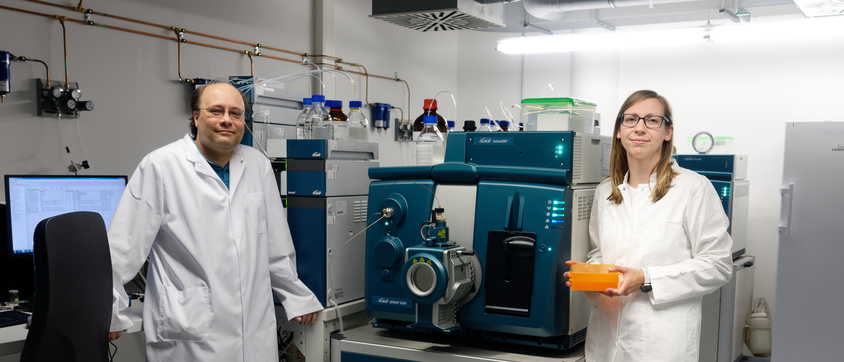Chanterelle mushrooms as a taste enhancer
New method for quality control of chanterelle mushrooms

Freising, June 30, 2020
Chanterelles give savoury dishes a rich body and a unique complex flavour. Experts refer to this as the kokumi effect. A research team from the Technical University of Munich (TUM) and the Leibniz-Institute for Food Systems Biology recently developed the first method to clearly quantify chanterelle-specific key substances that contribute to this effect. This method can also be used for quality control.
Chanterelles (Cantharellus cibarius) are one of the most popular mushrooms in Germany. Depending on the weather, chanterelle season starts in early July. Connoisseurs value the mushroom’s delicate fruity aroma, which is reminiscent of apricots, and its aromatic and slightly bitter taste profile. Not only do chanterelles have a unique flavour profile, they also function as taste enhancers, lending dishes a well-rounded mouthfeel and a lingering, rich flavour.
Key substances for the kokumi sensation
“Using the ultra-high-performance liquid chromatography-mass spectrometry method developed by our team, we are now the first to accurately quantify the key substances in chanterelles that are responsible for the kokumi effect”, says Dr. Verena Mittermeier from the TUM Chair of Food Chemistry and Molecular Sensory Science. Dr. Verena Mittermeier already contributed significantly to the study during her time as a PhD student under Prof. Thomas Hofmann, who now serves as the President of TUM.
As the research team’s findings show, the effect is caused by natural substances derived from fatty acids. Storage conditions, such as duration of storage and temperature, affect the composition and concentration of these fatty acid derivatives in the mushrooms. Whether the mushrooms are stored whole or chopped also plays a role.
New quality control marker
According to food chemist Andreas Dunkel from the Leibniz-Institute for Food Systems Biology, some of these derivatives are specific to chanterelles and can therefore be used as markers to control the quality of mushroom products. These findings could also be used to systematically improve the flavour profile of mushroom dishes or other savoury dishes using natural substances.
Andreas Dunkel explains: “Kokumi is a Japanese word that does not refer to a specific flavour quality such as salty or sweet.” Instead, the fatty acid derivatives modulate the sensory characteristics of other ingredients.
Publication: Mittermeier VK, Pauly K, Dunkel A, Hofmann T (2020) J Agric Food Chem 68 (20): 5741–5751, DOI: 10.1021/acs.jafc.0c02034. Ion-mobility-based liquid chromatography–mass spectrometry quantitation of taste-enhancing octadecadien-12-ynoic acids in mushrooms
https://pubs.acs.org/doi/10.1021/acs.jafc.0c02034
Further information:
This project was supported by Takasago Europe GmbH.
Contact:
Dr. Verena Mittermeier
TUM Chair of Food Chemistry and Molecular Sensory Science
Lise-Meitner-Straße 34
85354 Freising
Email: verena.mittermeier(at)tum.de
Phone: +49 8161 71 2992
Andreas Dunkel
Section III, Head of the working group 'Big Data Analysis'
Leibniz-Institute for Food Systems Biology
at the TUM (Leibniz-LSB@TUM)
Lise-Meitner-Straße 34
85354 Freising
Email: a.dunkel.leibniz-lsb@tum.de
Phone: +49 8161 71 2903
Press Contact:
Dr. Gisela Olias
Leibniz-LSB@TUM
Knowledgetransfer, Press and Public relations
Phone: +49 8161 71-2980
Email: g.olias.leibniz-lsb(at)tum.de
Information about the Institute
The Leibniz-Institute for Food Systems Biology at the Technical University of Munich (Leibniz-LSB@TUM) has a unique research profile. Its researchers combine methods of basic biomolecular research with analytical methods of bioinformatics and analytical high-performance technologies. Their goal is to decode the complex ingredient profiles from raw materials to the final food products and to elucidate their function as biological active molecules on humans. Based on their studies, the scientists develop products, which are as healthy as they are tasty. These foods will help to provide a sustainable and sufficient stream of food for future generations. In addition, the new scientific findings will be used to develop personalized nutritional concepts that, for example, help people with food intolerance without compromising quality of life and endangering their health.
The Leibniz LSB@TUM is a member of the Leibniz Association, which connects 96 independent research institutions. Their orientation ranges from the natural sciences, engineering and environmental sciences through economics, spatial and social sciences to the humanities. Leibniz Institutes devote themselves to social, economic and ecological issues. They conduct knowledge-oriented and application-oriented research, also in the overlapping Leibniz research networks, are or maintain scientific infrastructures and offer research-based services. The Leibniz Association focuses on knowledge transfer, especially with the Leibniz Research Museums. It advises and informs politics, science, business and the public. Leibniz institutions maintain close cooperation with universities - among others, in the form of the Leibniz Science Campuses, industry and other partners in Germany and abroad. They are subject to a transparent and independent review process. Due to their national significance, the federal government and the federal states jointly fund the institutes of the Leibniz Association. The Leibniz Institutes employ around 20,000 people, including 10,000 scientists. The entire budget of all the institutes is more than 1.9 billion euros.
